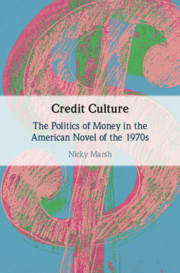Book contents
- Credit Culture
- Credit Culture
- Copyright page
- Dedication
- Contents
- Acknowledgements
- Introduction
- Chapter 1 No Place Like Home
- Chapter 2 Don DeLillo and American Credit
- Chapter 3 William Gaddis and Corporate Credit
- Chapter 4 When Women Counted
- Chapter 5 Toni Morrison and the Promise to Pay
- Chapter 6 Dorothy’s Endless Return
- Notes
- Index
Chapter 2 - Don DeLillo and American Credit
Published online by Cambridge University Press: 25 June 2020
- Credit Culture
- Credit Culture
- Copyright page
- Dedication
- Contents
- Acknowledgements
- Introduction
- Chapter 1 No Place Like Home
- Chapter 2 Don DeLillo and American Credit
- Chapter 3 William Gaddis and Corporate Credit
- Chapter 4 When Women Counted
- Chapter 5 Toni Morrison and the Promise to Pay
- Chapter 6 Dorothy’s Endless Return
- Notes
- Index
Summary
This chapter explores cultural and literary representations of the ending of the gold standard, the so-called Nixon shock of the early 1970s. It focuses on the ways in which this move to floating exchange rates was represented through a nationalist, often militarised, language and argues that this discourse functioned as a paradoxical alibi for the increased ascendancy of private capital that was actually occurring in this moment. It explores the rhetorical move from crisis to discipline as it was simultaneously appearing in political, economic and popular literary genres of the early 1970s. The first two sections contrast the difference between a political and an economic use of the language of discipline, emphasising the ascendancy of a neoliberal definition of the ‘real’ of the money economy. The final two sections examine the ways in which genre writers deployed the twinning of a military and economic crisis to explore the ironies of this moment. It specifically focuses on the work of Don DeLillo and traces the shift in his own ironical sense of the efficacy of genre itself.
Keywords
- Type
- Chapter
- Information
- Credit CultureThe Politics of Money in the American Novel of the 1970s, pp. 45 - 74Publisher: Cambridge University PressPrint publication year: 2020

